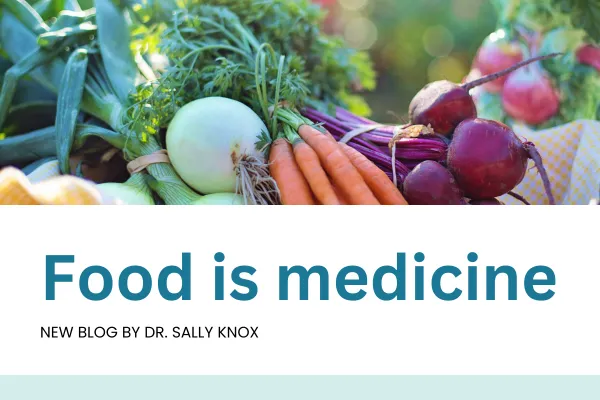Dr. Knox's Recent Blogs

Food is Medicine
In recent years, the idea of "food as medicine" has gained momentum, emphasizing the importance of making healthy food choices to prevent and treat various diseases.
The concept of food as medicine has been attributed to Hippocrates, although there is no evidence of him actually saying "Let food be thy medicine and medicine be thy food."
Regardless of the source, we've all sensed that food is an important contributor to health. Nutrient-dense foods, herbs, and spices have become buzz words recently.
Beyond pleasure and sustenance, food is a powerful tool to maintain and restore health.
A diet that includes a variety of nutrient-dense foods can help reduce the risk of chronic diseases such as heart disease, diabetes, and cancer.
A diet rich in fruits, vegetables, whole grains, and healthy fats has been linked to a lower risk of heart disease. Similarly, consuming foods that are high in fiber, such as legumes, whole grains, and vegetables, can help lower the risk of developing type 2 diabetes.
A diet rich in omega-3 fatty acids, found in fatty fish like salmon, can help reduce inflammation and alleviate symptoms of depression. Similarly, consuming foods that are high in antioxidants, such as berries, can help protect against oxidative stress, which is linked to various diseases.
Food is not necessarily a replacement for conventional medicine, rather a complement to medical treatment and a support to our bodies' natural healing processes.
Determining the nutrient density of that cucumber or tomato you're about to buy is a project underway. What if you had a hand-held device that could scan and determine the nutrient density on the spot in the grocery store? Research on such a device is ongoing and eagerly awaited.
For now, avoid processed foods and learn to prepare your own food. Just that significantly reduces the chemical exposure and helps the budget as well.
DOWNLOAD PDF
Resources
Willett, W. C. (2006). Prevention of chronic disease by means of diet and lifestyle changes. Disease Control Priorities in Developing Countries - NCBI Bookshelf. https://www.ncbi.nlm.nih.gov/books/NBK11795/
Mischoulon, D., MD PhD. (2020). Omega-3 fatty acids for mood disorders. Harvard Health. https://www.health.harvard.edu/blog/omega-3-fatty-acids-for-mood-disorders-2018080314414
Lobo V,. Patil, A., Phatak, A., & Chandra, N. (2010). Free radicals, antioxidants and functional foods: Impact on human health. Pharmacognosy Reviews, 4(8), 118. https://doi.org/10.4103/0973-7847.70902
Fiber foods. (2022, June 20). Centers for Disease Control and Prevention. https://www.cdc.gov/diabetes/library/features/role-of-fiber.html
Copyright SMK ©2025 All Rights Reserved -- Privacy policy | Terms of Service
